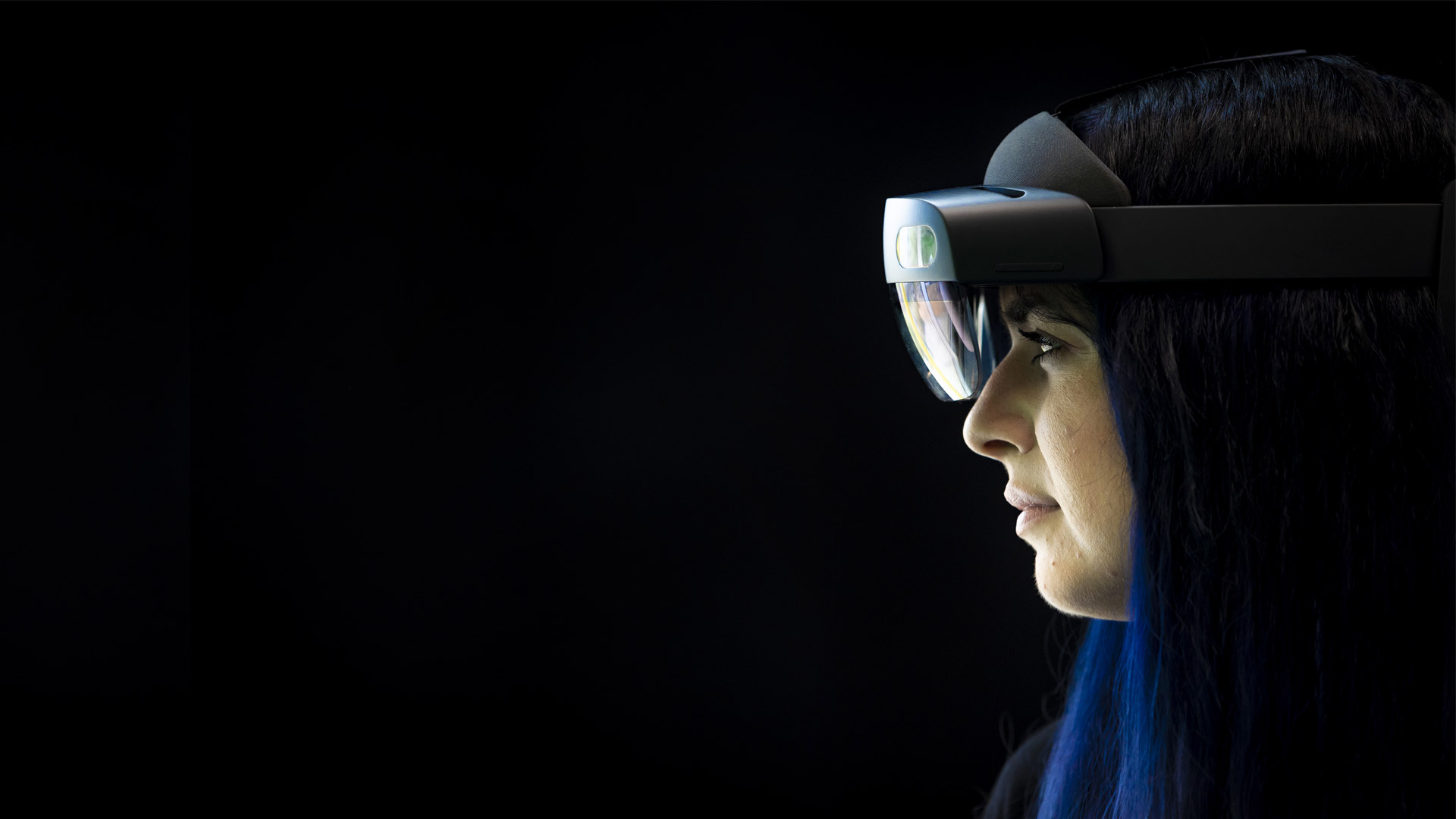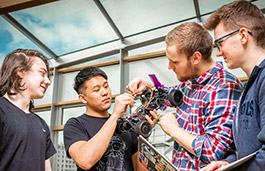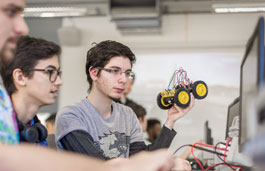Search
Interactive Media and Web Technologies BSc (Hons)
Study level: Undergraduate
This course is designed to prepare the next generation of immersive app developers, web programmers, digital media experts and code-savvy user interface designers.
Course features
Year of entry
2025-26
Location
Coventry University (Coventry)
Study mode
Full-time
Sandwich
Duration
3 years full-time
4 years sandwich
Condensed first year available
Course code
I150
Start date
January 2026 - condensed
This course has transitioned to a block teaching format from September 2026 and as part of the revision, has a new name. View the 2026/27 course, now called Digital Technology and Computing BSc (Hons)
Course overview
This course explores fundamental topics such as programming, interactive media, production, user experience design, web development, graphic design and visual effects.
This course aims to help you:
- understand software techniques and technologies
- master the principles of technical art, exploring animation, VFX, modelling and motion graphics
- become a professional full-stack web developer, able to generate a user-focused front-end and a technologically sound back-end, to any online project.
The January start for this course is condensed in Year 1. Please see the ‘How you’ll learn’ section below for more details.
Rated Gold Overall
Teaching Excellence Framework (TEF) 20235 QS Stars for Teaching and Facilities
QS Stars University RatingsTop 5 Student City in England (Coventry)
QS Best Student Cities Index 2026Why you should study this course
- Learn to apply technical knowledge to the development of creative content regularly found in creative industries such as film, TV, games and web.
- Develop a portfolio of work across a wide array of platforms and uses including web and mobile services, social media, virtual reality (VR) and immersive simulations using game engines.
- Have the chance to study as part of a community of creative content generators, working collaboratively to produce complex digital artefacts.
- Explore your creativity through a range of open-ended assessment briefs that focus on individuality and expression of ideas.
- Prepare for a career in the creative industry by practising commonly used industry-standard tools and learning techniques for working as part of a multi-disciplinary team.
If you choose to start this course in January you will study exactly the same course but over a slightly shorter timescale in Year 1. This is ideal if you missed the September start, want to transfer from a different university or course or just need a bit more time to prepare for life at university.
What you'll study
We regularly review our course content, to make it relevant and current for the benefit of our students. For these reasons, course modules may be updated.
How you'll learn
You can expect to learn about how to develop flat media (commonly used in advertising and print media), film and animation techniques (typically used in film and cinema) and web-based design practices that inform modern user interface and UX design of web services and mobile applications.
If you choose to start this course in January it will be run as a condensed programme. You’ll start your course in January and finish your first year in August. Upon successful completion of Year 1, you will progress onto Year 2 in September and then continue to start subsequent years of your course in September, completing your degree at the same time as the September starters unless you opt to do a placement year.
Teaching contact hours
As a full-time undergraduate student, you will study modules totalling 120 credits each academic year. A typical 20 credit module requires a total of 200 hours study. This is made up of teaching contact hours, guided and independent study.
Teaching hours:
Teaching hours vary each semester, year of study and due to module selection. During your first year you can expect 15-18 teaching hours each week. You will also have the option to attend optional sessions including time with a progress coach or to meet with staff for advice and feedback. As you progress through your studies, teaching hours may reduce.
Guided and independent study:
Throughout your studies, you will be expected to spend time in guided and independent study to make up the required study hours per module. You’ll be digging deeper into topics, review what you’ve learned and complete assignments. This can be completed around your personal commitments. As you progress through your studies, you’ll spend more time in independent study.
Online learning:
As an innovative university, we use different teaching methods including online tools and emerging technologies. So, some of your teaching hours and assessments may be delivered online.
Assessment
This course will be assessed using a variety of methods which will vary depending upon the module.
Assessment methods may include:
- phase tests
- essays
- group work
- presentations
- reports
- projects
- coursework
- exams
- individual assignments
- laboratories.
The Coventry University Group assessment strategy ensures that our courses are fairly assessed and allows us to monitor student progression towards achieving the intended learning outcomes.
Entry requirements
Typical entry requirements:
Fees and funding
| Student | Full-time | Part-time |
|---|---|---|
| UK, Ireland*, Channel Islands or Isle of Man | £9,535 per year | Not available |
| EU | £9,535 per year with EU Support Bursary** £19,850 per year without EU Support Bursary** |
Not available |
| International | £19,850 per year | Not available |
If you choose to study this course with a professional placement2 or study abroad year, you will need to pay a tuition fee3 to cover your academic support throughout your placement year. Students commencing their professional placement in the academic year 2027/28 will pay £1,500 if they are paying UK fees, or £1,800 if they are paying international fees.
For advice and guidance on tuition fees and student loans visit our Undergraduate Finance page and see The University’s Tuition Fee and Refund Terms and Conditions.
The University will charge the tuition fees that are stated in the above table for the first Academic Year of study. The University will review tuition fees each year. For UK (home) students, if Parliament permits an increase in tuition fees, the university may increase fees for each subsequent year of study in line with any such changes. Note that any increase is expected to be in line with inflation.
If you choose to study this course with a professional placement, the University will charge the tuition fees stated above for those on a placement during Academic Year 2027/28. The University will review professional placement tuition fees each year. For UK (home) students, the University may increase fees for each subsequent year of study, but such that it will be no more than 5% above inflation.
For international students, we may increase fees each year, but such increases will be no more than 5% above inflation. If you defer your course start date or have to extend your studies beyond the normal duration of the course (e.g. to repeat a year or resit examinations) the University reserves the right to charge you fees at a higher rate and/or in accordance with any legislative changes during the additional period of study.
We offer a range of International scholarships to students all over the world. For more information, visit our International Scholarships page.
Tuition fees cover the cost of your teaching, assessments, facilities and support services. There may be additional costs not covered by this fee such as accommodation and living costs, recommended reading books, stationery, printing and re-assessments should you need them. Find out what's included in your tuition costs.
The following are additional costs not included in the tuition fees:
- Any optional overseas field trips or visits: £400+ per trip.
- Any costs associated with securing, attending or completing a placement (whether in the UK or abroad).
Condensed course – January start date
If you choose to start this course in January please make sure you check the Fees and Finance page for more information. Although starting this course in January does not prohibit you from being eligible for student finance, the way it is paid in your first year differs from those who start their course in September.
If you start the course in January, your tuition fees will be paid in accordance with the university’s Tuition Fees, Refund and Withdrawal Terms and Conditions for January starters and for any further years of study, your fees will be paid in accordance with the terms for September starters.
*Irish student fees
The rights of Irish residents to study in the UK are preserved under the Common Travel Area arrangement. If you are an Irish student and meet the residency criteria, you can study in England, pay the same level of tuition fees as English students and utilise the Tuition Fee Loan.
**EU Support Bursary
Following the UK's exit from the European Union, we are offering financial support to all eligible EU students who wish to study an undergraduate or a postgraduate degree with us full-time. This bursary will be used to offset the cost of your tuition fees to bring them in line with that of UK students. Students studying a degree with a foundation year with us are not eligible for the bursary.
Facilities
Your studies will be centred in high-specification learning environments that benefit from extensive social learning facilities, well-appointed laboratories, industry-standard equipment, lecturing facilities and classrooms, facilitating our innovative teaching methods across a diverse suite of courses.
Take a virtual tour
Facilities are subject to availability. Access to some facilities (including some teaching and learning spaces) may vary from those advertised and/or may have reduced availability or restrictions where the university is following public authority guidance, decisions or orders.
Careers and opportunities
During the course, we aim to offer you opportunities to experience working on collaborative projects as part of a diverse team2.Upon successful completion of the course, you should have gained practical knowledge of a range of industry standard content creation tools4.
Graduates should be equipped with the knowledge and skills to effectively work within the creative industry, pursuing careers across areas including digital media, animation, user interface and UX design, game design and full-stack web development and mobile application development.
As a multi-disciplinary subject, the Interactive Media and Web Technologies BSc (Hons) is designed to produce design-conscious graduates that have a wealth of technical skills and knowledge of implementation. As the creative industry keeps growing, it relies increasingly on designers and content creators that have a fundamental knowledge of computer systems, their requirements and their limitations.
Learning to produce efficient digital media content, engage with collaborative design practices and understand the technical aspects of design, helps graduates become informed, socially responsible content creators and design practitioners.
Where our graduates work
The forerunner to this course was our multimedia computing course, graduates of that course have gone on to work at:
- Jaguar Land Rover – CGI Artist
- The AA – Learning Designer
- AIA – Associate, UX Research
- BlackRock – Senior Software Engineer
- Semcon – CGI Artist
- HedgedInterest – Lead Graphic Designer
- MOTIX Connected – Development Coordinator
- Blink Image Limited – Motion Graphics Designer
- TopCon Positioning Systems – UX Supervisor

Discover Phoenix+
Phoenix+ brings you together with other students to learn, experience and develop essential knowledge and skills. Whatever destination you choose, it's about preparing you for life after university.
Learn more about Phoenix+How to apply
You may also like

Computer Science with Artificial Intelligence BSc (Hons)

Information Technology Management BSc (Hons)






